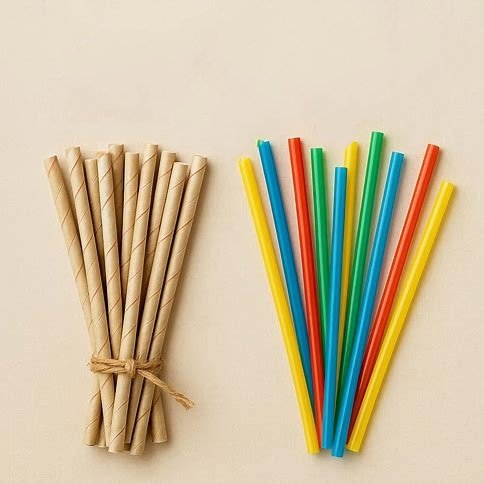Straws Against the Storm
I’m writing in the dental waiting area, not from the very start (I edited the time after writing), but it’s been an hour and a half now sitting here. I procrastinated this visit for days until last night, when I noticed a small cavity in one of my teeth. A little dark dot that shook my complacency. My teeth have always been the least problematic part of me, body and soul. My mom says I was almost a year old before my first two teeth came in, and she calls it a blessing: maybe I will lose my permanent ones late in life too.
There is dust on the sofas here. I am tempted to photograph this place. But no, not today. Maybe I will bring it up to the doctor if and when they call my name. Little things accumulate: a wall clock that keeps ticking, the smell of antiseptic, a layer of dust on a leather sofa. Then that tiny spot rather cavity on my tooth, and everything tilts.
At the same time my mind keeps leaping elsewhere. We live in a world that told us to swap plastic straws for paper straws because plastic was killing the seas. And yet, in this same world, entire cities have been turned to rubble. Bombings, chemicals, blood, children with wounds, killings; horrors that keep happening despite all the talk about small, easy fixes. How does that make sense?
The horrors of genocide are happening; humanitarian flotillas have been attacked; humanitarians are being denied access. The same world? No.
There are reports right now of a flotilla trying to deliver symbolic humanitarian aid being intercepted at sea. Activists say many boats were stopped and some participants detained as the convoy neared a blockade.
There are also repeated, documented denials of humanitarian access, and aid workers are being killed in record numbers — agencies and the U.N. have been flagging how unsafe and obstructed aid delivery has become.
Major human rights organizations and U.N. bodies have issued stark assessments about what is happening on the ground, with calls for urgent action and, in some reports, findings that amount to the gravest of accusations.
How on earth did we land here? Plastic straws are called a big threat, and this...
We live in a world that clutches at straws, fragile gestures against collapsing cities...
And I am here, in a waiting room with a dusty leather sofa, eyes wandering to charts about dental hygiene on the wall.
Half of me waits for my name, the other half drifts to cities in rubble. The silence of this place clashes with the thunder of bombs elsewhere.
The waiting grows louder in its silence, the dust sharper, until all that is left is the urge to write.
Either way, I will bring up the dust on the sofas, and I will bring with me these questions that will not leave my mouth. Not in his office at least.
Anyways, the receptionist just looked up. Maybe my name next...

I've been thinking all day about what I could say to you – without sounding distant or condescending. But there is no appropriate response. Everything has been said; your co-suffering is universal. Feel embraced!
0.00 SBD,
0.30 STEEM,
0.30 SP
Your words mean a lot. You’re right, sometimes there really are no new responses left, because pain of this magnitude speaks for itself. Yet even in silence, or in the simplest embrace, there is a shared resistance: the act of not turning away. Every reminder, every effort to raise awareness, is our way of saying the suffering won’t be erased, the voices won’t be silenced. Thank you for standing in this with me.
0.00 SBD,
0.26 STEEM,
0.26 SP